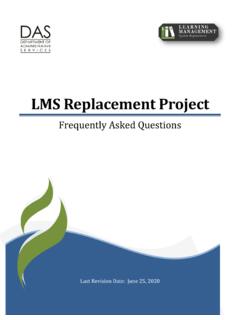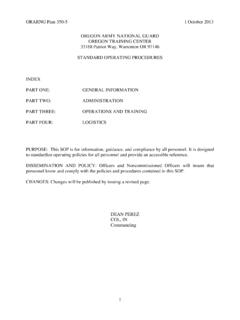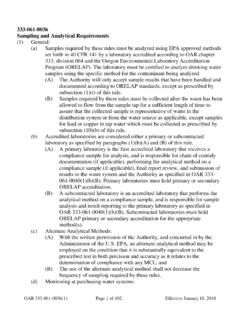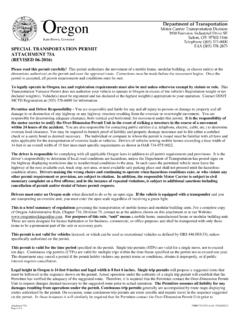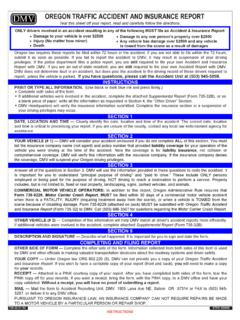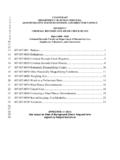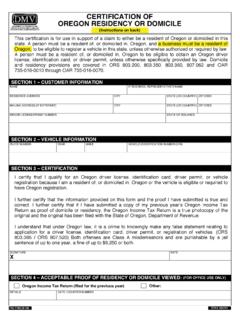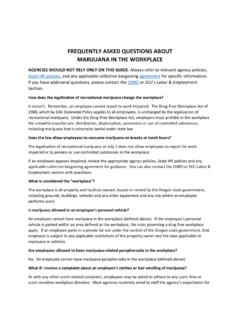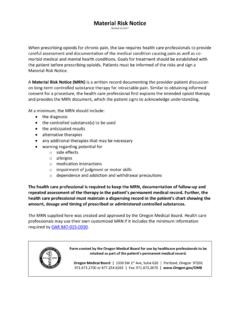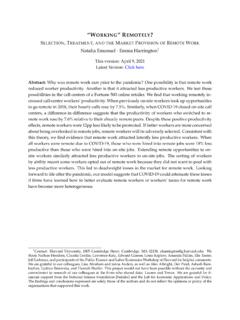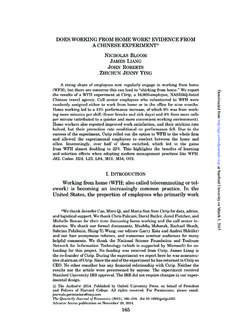Transcription of SUBJECT: Working Remotely NUMBER: DIVISION: EFFECTIVE …
1 APPROVED: Signature on file with the Chief Human Resources Office State HR Policy SUBJECT: Working Remotely NUMBER: DIVISION: Chief Human Resources Office EFFECTIVE DATE: 12/1/2021 POLICY STATEMENT: Oregon state government encourages Working Remotely where it is a viable option that benefits both the employee and the agency. AUTHORITY: ORS (3), , ; State HR Policy , Fair Labor Standards Act; and Enterprise Information Services (EIS) information technology and information security policies APPLICABILITY: All employees where not in conflict with applicable collective bargaining agreement. ATTACHMENTS: None DEFINITIONS: Also refer to State HR Policy , Definitions. WORKPLACE OPTIONS: Central Workplace: The agency-assigned location of the position, not the employee. It is normally where the position officially reports, but alternative workplaces can be agreed upon.
2 It is the permanent assignment of the employee s position within Oregon and is not their residence. Alternate Workplace: A workplace alternate to the central workplace that is within the employee s residence, or in a location requested by the employee and approved by the agency. Temporary Workplace: A place where the agency work assignment is expected to last less than a year. A temporary workplace would also include meeting sites held away from the central or alternate workplace. Mobile Workplace: A workplace alternate to the central workplace that changes frequently based on project work assignments, such as field work ( , maintenance, surveying, inspection, construction). Residence: The place where the employee personally resides. State HR Policy Working Remotely Policy: 2 of 5 EFFECTIVE : 12/1/2021 WORKTYPE OPTIONS: Full-time Remote Work: All essential functions of the position are performed from an alternate workplace 100% of the time.
3 Business needs may require the employee to come into the central or mobile workplace to perform work on a periodic basis. Work at the central workplace is generally performed less than eight occurrences a year. Hybrid Work: Essential functions of the position are performed from an alternate workplace, as well as at the central or mobile workplace. Work at the central workplace is generally performed at least eight occurrences a year. In-office Work: Work for this position must be completed in the central workplace. Mobile Work: The essential functions of the position require the employee to perform work in a variety of locations. Mobile work may encompass a district, region or other geographic location. Suitable Positions: Positions with limited need for direct supervision and access to hard-copy files; limited need for face-to-face contact with other employees, clients and customers; and limited need for access to the agency s resources.
4 POLICY: Use of alternate work options promote the health and safety of Oregonians; ensures high-quality work and optimal use of resources for agencies; ensures that cultural, equity and accessibility issues are addressed in a meaningful way; and supports flexibility and work-life balance for employees. It also offers the opportunity to be more flexible in interactions with Oregonians and decreases an agency's impact on the environment. (1) An agency director shall administer State HR Policy as the agency s policy on Working Remotely . (2) Employees may work Remotely full-time, on a hybrid schedule, or on an as-needed basis upon approval of their supervisor. (3) An employee s salary and employer-sponsored insurance coverage do not change as a result of full-time remote, hybrid, or mobile work. (4) Initiation of Full-time Remote or Hybrid Work (a) Current employees or their supervisor can initiate interest in exercising full-time remote or hybrid work options.
5 (b) Employee requests for full-time remote or hybrid work must be documented in the state human resources information system and responded to within 30 calendar days. (c) Successful positions for full-time remote or hybrid work include, but are not limited to: State HR Policy Working Remotely Policy: 3 of 5 EFFECTIVE : 12/1/2021 (A) Positions that are assigned duties suitable for Working full-time remote or hybrid. (B) Employees who consistently demonstrate work habits that are well-suited to Working full-time remote or hybrid, including, but not limited to: self-motivation, self-discipline, the ability to work independently, the ability to manage distractions, the ability to meet deadlines, and a demonstrated record of meeting established performance expectations. (C) Full-time remote or hybrid work meets the agency s business and operational needs, as well as those of the agency s customers and the employee.
6 (5) Agreement (a) Employees who work full-time remote or hybrid will acknowledge and document the following in the state human resources information system: (A) This Working Remotely policy (B) The security classification of information used (C) The asset tracking survey (D) Remote work guidelines (b) Agreements for out-of-state full-time or hybrid work will be maintained in the state human resources information system. (c) During the recruitment process, agencies may offer full-time remote, or hybrid work as either a requirement or option. (d) An agreement to work full-time remote or hybrid may be discontinued by either party at any time. When an employer rescinds an agreement, it must provide the employee the reasons for the rescission in writing. An employer shall only rescind full-time remote or hybrid work on the basis of sound business reasons.
7 Once the written explanation has been provided, the employer may rescind the full-time remote or hybrid work agreement with a minimum of seven (7) days notice. (e) The employee maintains a clean and safe alternate workspace. The employee must immediately report to the supervisor any injury that occurs during work hours. The state is not responsible for loss, damage, repair, replacement, or wear of personal property. (f) Employees will not hold business visits or in-person meetings with an agency s customers or co-workers at the alternate workplace unless approved by the employee's supervisor. (g) The agency may require employees who work full-time remote or hybrid to share workspace with other employees when at their central workplace. State HR Policy Working Remotely Policy: 4 of 5 EFFECTIVE : 12/1/2021 (h) Employees Working full-time remote, or hybrid will adhere to all expectations, standards, and policies as if they were performing work at their agency s central workplace, including adherence to performance standards and measurements.
8 (i) The employee shall promptly notify their supervisor when the employee is unable to perform work assignments due to equipment failure, safety hazard or other unforeseen circumstances. (6) Security (a) Supervisors will ensure the employee has received information security training as well as agency and EIS policies and protocols related to software, hardware and information and data security. (b) Employees will ensure the appropriate level of security for state information and equipment in transit or at the alternate workplace. (7) Technology, Devices and Office Supplies (a) Employees who work outside of state-owned or leased buildings shall have internet coverage, allowing the employee to perform assigned duties and participate in phone conferences and virtual meetings during scheduled work hours. Internet connectivity provided through state-owned equipment may be arranged upon approval of the agency.
9 (b) The agency provides basic technology equipment and related devices necessary for the employee to perform their assigned job duties at the alternate workplace. The equipment and devices are for agency business only and must comply with the agency s desktop security and maintenance policies and practices. Employees will not conduct state business on the following personal equipment: phones, computers, laptops or other information-storing devices. (A) Exceptions to (b) above are subject to the approval of the State Chief Operating Officer. (c) Additional technology, devices and office supplies may be provided to the employee at the discretion of the agency or in accordance with the Americans with Disabilities Act (ADA). (d) Employees may access the State Surplus Property warehouse with management approval. State HR Policy Working Remotely Policy: 5 of 5 EFFECTIVE : 12/1/2021 (8) Travel Reimbursement (a) Employees who work under the hybrid work model are responsible to pay for their travel between the alternate and central workplaces.
10 (b) Employees who work under the full-time remote work model must be reimbursed by the agency for travel to and from the central workplace. (A) Agencies must reimburse full-time remote worker travel expenses, compensate the employee for travel time in accordance with the FLSA, and determine the liability the agency will incur while the employee is on travel status. (9) Working Outside of Oregon (a) Decisions about out-of-state remote work will be made on a case-by-case basis and may be informed by factors that include legal compliance obligations of the other state. (b) When an employee s alternate workplace is outside of Oregon, the agency s Human Resources Department designee must request a workers compensation insurance assessment from DAS Risk Management to determine if out-of-state workers compensation coverage is needed. If additional coverage is needed, DAS Risk Management arranges for the coverage.
